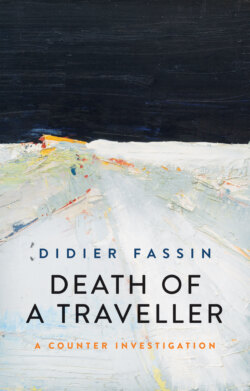Читать книгу Death of a Traveller - Didier Fassin - Страница 10
Preamble
ОглавлениеThis is a book of a singular kind. It is not the result of a traditional sociological investigation. It is a counter-investigation. I explain how it arose in the prologue. It seeks to shed light on the death of a man through the accounts of those who killed him and those who were more or less immediate witnesses to the scene. It also attempts to analyze the judicial handling of the case up until it was dismissed, those who fired the fatal shots being exculpated on grounds of legitimate self-defense. Inset between these two elements is a description of the reactions of the deceased man’s family and a reconstruction of the victim’s life story. I present the accounts of the protagonists as faithfully as possible through the use of a subjective, third-person narrative. By contrast, I examine the judicial process through a critical lens, in order to show how choices were made early on between irreconcilable versions of the story, resulting in problematic decisions. On the basis of a re-examination of the individual accounts and the case file, I then propose a different version of the facts that makes it possible to integrate the contradictions, divergences and discrepancies that remain in the judges’ interpretation. The aim is thus to create, around this tragic case, an experimental form of writing that honors the diverse viewpoints, as evoked in the epigraph from Rumi, while at the same time ultimately acknowledging my own perspective, at the end of an inquiry inspired by the quotation from Nietzsche. The unusual approach I have adopted raises two questions.
First, can I be said to take sides? This is a charge readily leveled against sociologists and anthropologists, who are often suspected of taking the part of the dominated. The observation is not entirely without foundation, and there is, moreover, no such thing as total impartiality. But here the opposite argument is called for. Once the magistrates have fully accepted one version of the events and rejected the other, the simple fact of giving equal weight to each, as I do here, and thus presenting them as both equally credible, tends to be seen as a failure of impartiality, whereas in fact it testifies to an effort to restore it. In this respect I show, in the sections focusing on the conditions of production of truth and lies in legal cases, that this case is far from an anomaly. It is not the exception, but the rule. It reveals not a dysfunctional justice system but its normal functioning, which needs to be analyzed as such if we are to understand the logics that prevail in the handling of such cases.
Second, is this work still one of social science? Admittedly, it does not follow the traditional forms of the discipline. Subjective recounting of the facts belongs to literature, the conduct of the inquiry is reminiscent of a particular kind of journalism, and the reconstruction of the investigation without doubt echoes the form of the criminal investigation process. These comparisons are reasonable, in my view, and in no way discreditable. But I contend that I maintain certain fundamental principles of the social sciences: empirical research based on a field study supplemented by examination of documents; equal attention accorded to the words of all those involved; a commitment to subject all available evidence to critical examination; the desire to go beyond the individual case and reveal the generality of social processes; and, indeed, the acknowledgment of the presence of the researcher, whom I have chosen to present from the outset as one protagonist among others.
Although the criminal investigation is long since over, the dismissal of the case was confirmed on appeal, and the petition to the Court of Cassation was judged inadmissible, it is probable that the case will be referred to the European Court of Human Rights. The way I have written it, presenting an honest reconstruction of the points of view of the main protagonists and a rigorous analysis of all the evidence in the investigation case file, and eventually putting forward an account of the events that differs from that of the justice system, takes this possibility into account.
